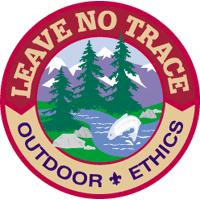
Respect Wildlife

All things share the same breath - the beast, the tree, the man - the air
shares its spirit with all the life it supports. |
 Traveling through wilderness, humans are the visitors. We are passing through the homes and habitat of wild animals and our behavior should be much like what is expected when visiting another human's home.
Traveling through wilderness, humans are the visitors. We are passing through the homes and habitat of wild animals and our behavior should be much like what is expected when visiting another human's home.
In the home of others, we take off our shoes to keep the floor clean, sit on chairs rather than countertops or backs of couches, admire the artwork but don't take it home, use the bathroom carefully, talk politely, and help clean up toys and dishes.
In the wild, we walk on trails and sit on durable surfaces, enjoy the surroundings but don't take souvenirs, dispose of waste properly, leave wildlife alone, and clean up when we leave.
 Wildlife can adapt to human presence over time.
Wildlife can adapt to human presence over time.
In my neighborhood, we have deer, rabbit, squirrel, pheasant, ducks, geese, and many other animals that were here before the housing development. The animals roam through yards and sometimes seem oblivious to people walking past. This is hardly what we are looking for when we venture into the wilds, though. I expect a pheasant to explode in a flurry if I happen to pass too close. I expect to see a glimpse of a white tail through the trees if I startle a deer. I expect squirrels to chatter at me from high in a tree. This is wildlife.
The less interaction between animals and humans, the more wild things remain. To preserve the wildness of an area, there are many small things to do which can have a significant influence on the residents.
Here are a few:
- Group Size - I love to walk alone in the early morning. One person is nearly silent and can see and hear animals that even two people will disturb. But, a group of 8 or 9 will probably see no wildlife at all. Keep your group small to make less disturbance, do less damage, and see more wildlife.
- Pets - leave pets at home. If you insist on bringing a domestic animal into the wilds, take the responsibility of controlling it. A leash does no good unless it is on the animal's neck. Whistling for a dog that has a scent creates a big ruckus and doesn't bring the dog back. Allowing a pet to chase wildlife is about the most disrespectful activity a human can do.
- Water Access - the local inhabitants need water. If campers are close to the lake or stream, or close to the access path to it, then wildlife are prevented from drinking. Swim in the afternoon, but stay away from the water in early morning and evening so animals can use it. Be especially sensitive about water access in arid regions and during dry spells.
- Food - wild animals need to find nutrition in their natural environment. A hotdog, bag of peanuts, cookie crumbs, or anything else we eat is not natural or nutritious to wildlife. A considerate person cleans up all food waste and crumbs, protects food from scavengers, and disposes of waste so it is not a temptation to animals.
A bear, raccoon, jaybird, or chipmunk that has discovered easy pickings at a campsite will become a nuisance and possibly a danger. Once an animal has found food, it will return to that place many times hoping to find more. Through careful food handling, campers can keep a site clean and unattractive to wildlife. 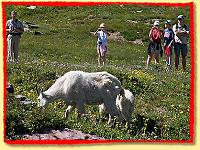 Observation - seeing a wild sheep, elk, bear, or moose is a real thrill. So thrilling in fact that some people want to prove it by getting in a picture with the animal - Bad Idea! Watching animals from afar, maybe through binoculars, is best.
Observation - seeing a wild sheep, elk, bear, or moose is a real thrill. So thrilling in fact that some people want to prove it by getting in a picture with the animal - Bad Idea! Watching animals from afar, maybe through binoculars, is best.
It also may be tempting to startle an animal to make it move - maybe chase a rabbit around or toss a stone at a bird in a tree. Animals don't have a grocery store back home to buy all the food they want. If they expend energy avoiding humans, that is energy they need to work very hard to replenish. Watch animals quietly at a distance for maximum enjoyment and learning of their natural habits.- Noise - animals, just like people, are startled by loud noises. Loud talk on the trail, music, singing, and any other noise we make should be controlled. Besides being stressful to animals, a group making noise ruins the experience of other campers in the area.
- Young - Young animals are a special concern. Parent animals will agressively protect their young so getting too close to a baby may be dangerous to humans. Young are also more susceptible to stress and injury when molested by humans. Parents may abandon a baby if it or the nest or den has a strange scent from human handling.
Plan a trip so it does not impact sensitive rearing times or ensure your route will not take you close to nesting areas.
 Tips on Respecting Wildlife
Tips on Respecting Wildlife
- Carry binoculars
- Carry identification pamphlets for birds, animals, and plants.
- If the wildlife changes its normal habits, then you are too close.
- Set up camp at least 200 feet from water so animals have access to it.
- Wash dishes and bodies far from the water source so it is not contaminated.
- Drop no crumbs, leave no waste, feed no pests.
- Keep alert with eyes, ears, and nose for signs of wildlife.
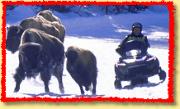 Respecting Wildlife is Important because:
Respecting Wildlife is Important because:
- Harrassed animals waste energy that they need to survive
- Altered habitat may become unusable by wildlife
- Habituated animals can become aggressive and dangerous
- Both intentional and unintentional disturbance results in negative impact
- We are the vistors, they are the permanent residents
Examples To Consider
| In popular campsites, the local rodents get used to finding easy pickings left by humans and begin to hunt in bags and packs for the free food. It's a lot easier than searching out natural food and soon they discover that biting holes through plastic bags and backpacks is pretty easy. Open food with a knife instead of tearing the package and hold it over or inside a large plastic bag to catch crumbs. Eat your food over a bandana on your lap or a plastic bag. | 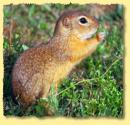 |
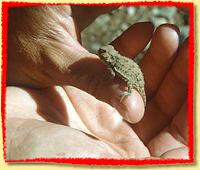 | A student found this very interesting little lizard and brought it back to show his group. After petting its cool bumps and taking a couple pictures, it was carefully set down along the trail. The sweat and oil from his hands and being displaced from its regular habitat killed the lizard in a few days. |
| How badly do you want that picture of yourself with a wild animal? This person is completely clueless about the danger she is in. | 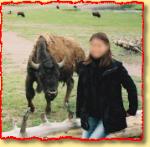 |
Teaching Respect Wildlife
- General Teaching Advice - good ways to get people to learn
- Animal Thoughts - put yourself in their place
- Stop Bothering Me - how we harrass animals
